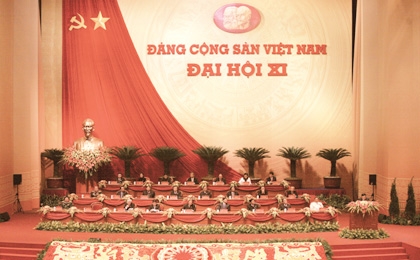Party congress talks up sustainable future
 |
| The 11th Vietnam Party Congress will set targets aimed at making the country a modern, industrialised nation by 2020 |
This is one of the key issues discussed by almost 1,400 party members at the 11th Vietnam Communist Party Congress, which is taking place in Hanoi from January 12-19.
The congress is scheduled to discuss and ratify development plans and strategies for the country’s economy, politics, culture, social affairs, national defence and security, and diplomacy. It will also elect the nation’s elite leaders for the next five years.
Discussions at the congress are based around themes including: continually enhancing the Party’s leadership capacity and combativeness, promoting the nation’s synergy, comprehensively boosting the doi moi process, and creating the fundamentals for Vietnam to become a modern and industrialised nation by 2020.
“The coming years are a period in which the economy of our country will recover and return to the fast growth pace after a period of slowdown. We will also restructure the economy for fast and sustainable development,” said Party General Secretary Nong Duc Manh at the opening session of the congress.
“After 25 years of the doi moi policy, we have seen huge achievements of historical significance,” Manh underlined.
He stressed that the overall goal set for Vietnam when it accomplished the transitional period to socialism would be to establish a fundamental base for a socialist economy.
He said this would entail a suitable political, ideological and cultural superstructure which would lay the foundation for Vietnam to become a prosperous and happy socialist country.
Over the 2001-2010 period, Vietnam’s annual economic growth averaged 7.26 per cent, helping to lift the country from a less-developed nation into a nation with middle-income status.
The country’s gross domestic product (GDP) per capita was posted at $1,168 and the nation’s poverty rate plunged to 10 per cent in 2010.
“The 2011-2020 socio-economic development strategy will look to continue speeding up industrialisation and modernisation and promoting fast, sustainable development, bringing into full play the entire nation’s strength, and making the country become an industrialised one which operates in line with socialist orientation,” said Manh.
Vietnam’s GDP growth target for the 10-year period until 2020 will be 7-8 per cent per annum with GDP per capita expected to reach $3,000 by the end of the decade.
Minister of Planning and Investment Vo Hong Phuc said that sustainable development was pivotal for Vietnam, suggesting that macroeconomic stability and the harmony of economic growth and quality should be the country’s development priorities in the upcoming decade.
“Vietnam’s growth quality, productivity, efficiency and the economic competitiveness are still low. Our productivity is now much lower than other regional economies, for example 2.6 times and 4.3 times lower than that of China and Thailand, respectively,” he noted.
“Comprehensive improvement of human resources is the key solution to the pending problems,” Phuc said.
Pham Khoi Nguyen, minister of Natural Resources and Environment was keen to stress that Vietnam needed to focus on restructuring the economy and make it friendlier to the environment by adopting the ‘green growth’ model which was mentioned in the draft socio-economic development strategy for 2011-2020.
“The market economy should be applied to the environment sector to increase the efficiency of state management and raise the sector’s contribution to the national economy,” Nguyen said.
“Meanwhile public awareness should be further raised on threats to the environment, including climate change and rising sea levels,” He told congress participants.
What the stars mean:
★ Poor ★ ★ Promising ★★★ Good ★★★★ Very good ★★★★★ Exceptional
Related Contents
Latest News
More News
- Foreign leaders extend congratulations to Party General Secretary To Lam (January 25, 2026 | 10:01)
- 14th National Party Congress wraps up with success (January 25, 2026 | 09:49)
- Congratulations from VFF Central Committee's int’l partners to 14th National Party Congress (January 25, 2026 | 09:46)
- 14th Party Central Committee unanimously elects To Lam as General Secretary (January 23, 2026 | 16:22)
- Worldwide congratulations underscore confidence in Vietnam’s 14th Party Congress (January 23, 2026 | 09:02)
- Political parties, organisations, int’l friends send congratulations to 14th National Party Congress (January 22, 2026 | 09:33)
- Press release on second working day of 14th National Party Congress (January 22, 2026 | 09:19)
- 14th National Party Congress: Japanese media highlight Vietnam’s growth targets (January 21, 2026 | 09:46)
- 14th National Party Congress: Driving force for Vietnam to continue renewal, innovation, breakthroughs (January 21, 2026 | 09:42)
- Vietnam remains spiritual support for progressive forces: Colombian party leader (January 21, 2026 | 08:00)

 Tag:
Tag:


















 Mobile Version
Mobile Version